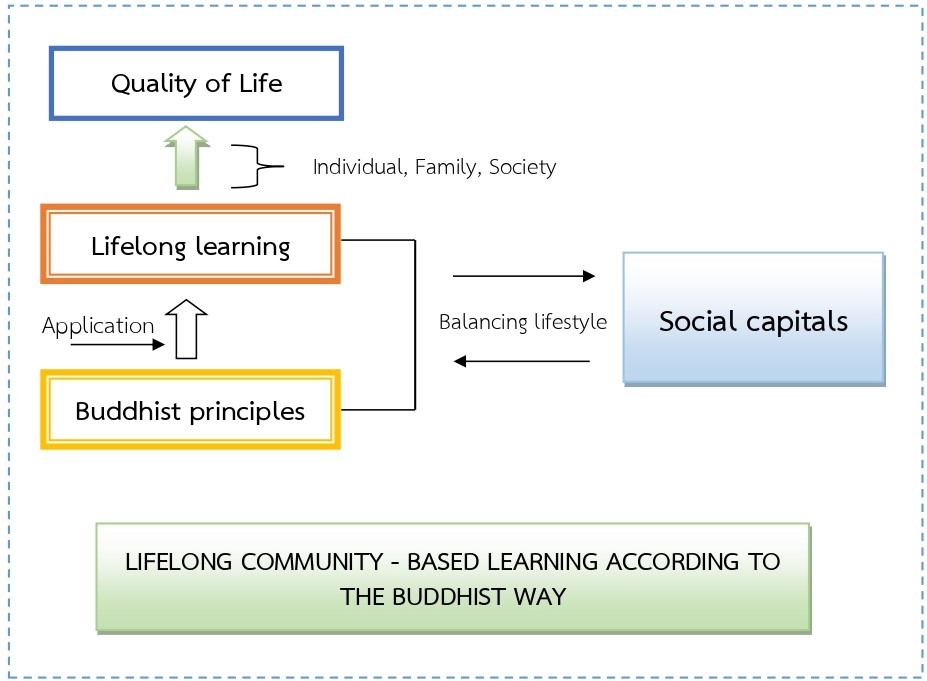COMMUNITY-BASED LIFELONG LEARNING ACCORDING TO THE BUDDHIST WAY: A CASE STUDY OF WAT PA LELAIK WORAWIHAN, MUEANG DISTRICT, SUPHANBURI PROVINCE
Keywords:
Lifelong learning, Community Based, Buddhist wayAbstract
Background and Objectives: The rapidly changing situation has resulted in a change in the learning of Thai society. Focusing on learning and encouraging people to be up-to-date learners will be an important approach to public development. People will be knowledgeable about society and culture that are fundamental to their lifestyles and be able to bring it back to their own development. Community context-based Learning is therefore important and should be promoted and developed for sustainability. The objectives of this research are: studying the situation and context of community-based lifelong learning according to the Buddhist way, and presenting guidelines for promoting lifelong learning using the community as a base according to the Buddhist way.
Methodology: This qualitative analysis data was obtained from documents and field research tools, including structured interviews, group discussions, in-depth interviews, knowledge management, and lessons learned.
Main Results: The results of the research showed that: 1) The situations and context of community-based lifelong learning according to the Buddhist way of Wat Pa Lelaik Worawihan consisted of; 1.1) The local context of the temple located in the community for a long time as the spiritual center of Buddhists in Suphan Buri province and "Luang Por To" Buddha image considered as the center of Buddhist faith, 1.2) Significant costs included the history of the temple, mural narrative paintings, the exhibition of Khun Chang House showing the traditions and traditional culture of Suphan Buri province, being an exhibition space and a community learning source. 2) Guidelines for promoting community-based lifelong learning according to the Buddhist way suggested that; 2.1) It should have further developed its community to be the base of Buddhist learning, 2.2) It should have further developed its opportunity for sustainable lifelong learning.
Involvement to Buddhadhamma: Lifelong learning is an educational principle that has been in the lifestyle of Thai society for a long time. It is the process of passing on knowledge and culture from generation to generation. It is in line with the Buddhist principle of Trisikkha, consisting of morality, concentration, and wisdom, and the four principles of Bhāvanā, consisting of Kāya-bhāvanā (Physical development), Sīla-bhāvanā (Moral development), Citta-bhāvanā (Emotional development), and Paññā-bhāvanā (Wisdom development), are studies that focus one’ potential development all the time to keep up with changes in each age and learning about the context of the community, especially the social capital, and the ultimate goal is to improve the quality of life for members of society.
Conclusions: Lifelong learning was an important basis for the potential of society members to learn and adapt to the various changes that occur in daily life. Buddhist principles were principles that were consistent with the way of life of the community. Communities could have learned and applied it in line with their own way of life. In addition, the principles of Buddhism were also unique in that they were flexible and consistent with various situations. A case study of Wat Pa Lelaik Worawihan, Mueang District, Suphan Buri Province, was a true reflection of lifelong learning based on the social and cultural foundations of Thailand.
References
Charoenlak, N. (2023). Education and Community Development for Sustainability: The Continuation of The Loy Krathong Tradition of Berk Phrai Sub-District, Chom Bueng District, Ratchaburi Province. Journal of MCU Nakhondhat, 10(8), 30-42.
Krudnak, N., Sunyamo, T., Nilkote, R., Rueangsri, W. & Visesprapa, P. (2022). Ethnic Identty Under Neo-Liberalism Economy and Promotion of Learninglifelong of Tai Dam Community, Khao Yoi District, Phetchaburi Province. Journal of Social Science Development, 5(2), 79-98.
Nilkote, R. & Charoenlak, N. (2022). Community Well–being Development through Community Context–based Applications: A Case Study of the Thai Songdam Dance in Ban Don Thong, Don Khoi, Kamphaeng Saen, Nakhon Pathom. Journal of Cultural, 5(2), 94-110.
Office of the Secretariat of the Education Council. (2017). National Education Plan 2017-2032. Chili Wan Graphic Company Limited.
Office of the Secretariat of the Education Council. (2018). Thai Study Report 2018. Prikwan Graphic Company Limited.
Somdet Phra Buddhakosajarn (P.A. Payutto). (2021). Education to develop civilization to be called Siam Samtri, Study 3, Development 4 (9th ed.). Pim Suay Company Limited.
Suphanburi Provincial Education Office. (2023). Suphanburi Provincial Education Development Plan, 5-year period (2023-2027). Policy and Planning Group Suphanburi Provincial Education Office.
Suphanburi Provincial Office. (2023). Suphanburi Provincial Development Plan (2023-2027). Provincial Development Office.
Tansiri, W. (1999). Explanation of the National Education Act 1999. Winyuchon.
Wat Pa Lelaik Worawihan. (2014). Report on the performance of the Buddhist monks (Saing Sirintaro, Ph.D. 8 Honorary Ph.D.) Advisor to the Primate Region 14 Abbot of Wat Pa Lelaik Worawihan. Wat Pa Lelaik Worawihan.
Wisthawet, W. & Wannapok, S. (2001). Buddhism. Wattana Panich Publishing House.
Yakaew, C., Khwunma, K., Gowithayakorn, T., Namwong, P., & Tongsaard, K. (2023). The Development of a Set of Learning Experiences for Local Wisdom in Historic Sites and Important People to Promote the Child Development in Suphan Buri Province. Journal of Multidisciplinary in Social Sciences, 15(3), 52-61.

Downloads
Published
How to Cite
Issue
Section
License
Copyright (c) 2023 Journal of Buddhist Anthropology

This work is licensed under a Creative Commons Attribution-NonCommercial-NoDerivatives 4.0 International License.








